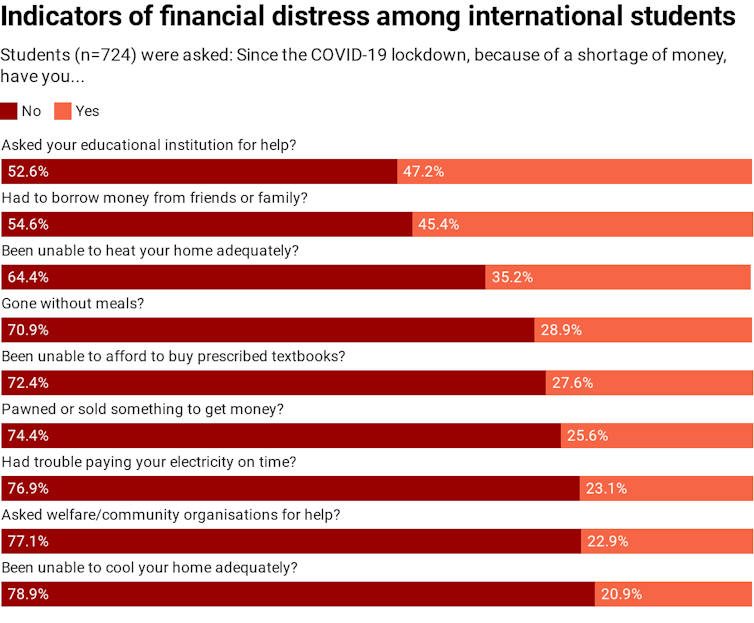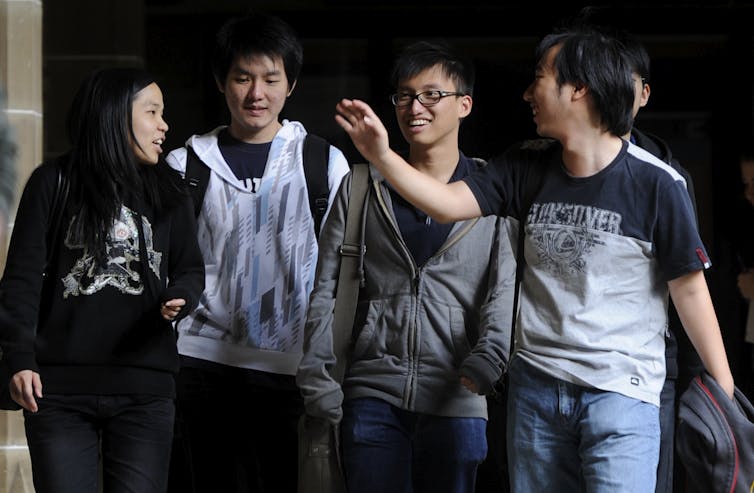'No one would even know if I had died in my room': coronavirus leaves international students in dire straits
- Written by Alan Morris, Professor, Institute of Public Policy and Governance, University of Technology Sydney
Many international students in private rental housing in Sydney and Melbourne were struggling before COVID-19 hit. Our surveys of these students before and during the pandemic show it has made their already precarious situations much worse.
Of those with paid work when the pandemic began, six in ten lost their jobs. Many were struggling to pay rent and tuition fees.
Read more: Why coronavirus impacts are devastating for international students in private rental housing
Our new report is based on two surveys* of several thousand students. To track financial distress, we developed eight indicators from Australian Bureau of Statistics measures for the first survey in late 2019. We used these again for the second survey in mid-2020. The responses are shown below.
 Author provided
Since the lockdown, students’ responses showed:
29% of respondents had gone without meals (up from 22% prior to lockdown)
26% had pawned or sold something to obtain money (up from 12%)
23% had had trouble paying for electricity on time (up from 11%)
23% had asked community organisations for help (up from 4%).
Our 2019 survey showed about one in five international students in the private rental sector were already in precarious housing situations. The second survey revealed far more were living precariously because of deteriorating finances during the pandemic.
Read more:
90,000 foreign graduates are stuck in Australia without financial support: it's a humanitarian and economic crisis in the making
This article also draws on 26 semi-structured interviews with students to share fresh insights into how they have coped as the pandemic unfolded in Sydney and Melbourne.
Incomes from work and family lost
The central financial issue has been loss of income during the pandemic. Just 15% of students who’d lost jobs had found a new one. Almost two-thirds (63%) of those who still had a job had had their hours cut, most by about 50%.
At the same time, financial support from families decreased for just over four in ten students. Only 12% said it had increased.
Before the pandemic, 50% of respondents reported an income below A$500 a week; after it began, 70% did.
Struggling to pay the rent
Six in ten respondents agreed paying the rent had become more difficult. Since the pandemic, 27% said they were unable to pay the full rent. One in five agreed or strongly agreed with the statement: “I feel I could become homeless.”
A VET student described the impact of losing her job on her finances:
I could really save some money in the month of February and March that really, you know, took me until the month of April. So, I was not really worried in April, but then as May started and nearly the middle of May, I was really worried about my account balance. I’d already given multiple calls to different organisations by then for any kind of support.
Half of our respondents reported trying to negotiate a rent reduction: 22% received a reduction and 31% received a reduction or a deferral. Almost half were unsuccessful. A university student from Melbourne outlined her failed attempt to reduce rent:
Yeah, we are worrying [about paying the rent] and like we emailed to our agency to make discount or something like that, but they said it’s hard for them, an agency and landlord too, because the landlord has a mortgage […] and everybody’s struggling and so for now they don’t have any discount […] so we are worried because before that, before this current thing [the pandemic], we had our part-time jobs and the three of us have now lost our jobs.
Author provided
Since the lockdown, students’ responses showed:
29% of respondents had gone without meals (up from 22% prior to lockdown)
26% had pawned or sold something to obtain money (up from 12%)
23% had had trouble paying for electricity on time (up from 11%)
23% had asked community organisations for help (up from 4%).
Our 2019 survey showed about one in five international students in the private rental sector were already in precarious housing situations. The second survey revealed far more were living precariously because of deteriorating finances during the pandemic.
Read more:
90,000 foreign graduates are stuck in Australia without financial support: it's a humanitarian and economic crisis in the making
This article also draws on 26 semi-structured interviews with students to share fresh insights into how they have coped as the pandemic unfolded in Sydney and Melbourne.
Incomes from work and family lost
The central financial issue has been loss of income during the pandemic. Just 15% of students who’d lost jobs had found a new one. Almost two-thirds (63%) of those who still had a job had had their hours cut, most by about 50%.
At the same time, financial support from families decreased for just over four in ten students. Only 12% said it had increased.
Before the pandemic, 50% of respondents reported an income below A$500 a week; after it began, 70% did.
Struggling to pay the rent
Six in ten respondents agreed paying the rent had become more difficult. Since the pandemic, 27% said they were unable to pay the full rent. One in five agreed or strongly agreed with the statement: “I feel I could become homeless.”
A VET student described the impact of losing her job on her finances:
I could really save some money in the month of February and March that really, you know, took me until the month of April. So, I was not really worried in April, but then as May started and nearly the middle of May, I was really worried about my account balance. I’d already given multiple calls to different organisations by then for any kind of support.
Half of our respondents reported trying to negotiate a rent reduction: 22% received a reduction and 31% received a reduction or a deferral. Almost half were unsuccessful. A university student from Melbourne outlined her failed attempt to reduce rent:
Yeah, we are worrying [about paying the rent] and like we emailed to our agency to make discount or something like that, but they said it’s hard for them, an agency and landlord too, because the landlord has a mortgage […] and everybody’s struggling and so for now they don’t have any discount […] so we are worried because before that, before this current thing [the pandemic], we had our part-time jobs and the three of us have now lost our jobs.
 In some share houses, all the students have lost their jobs and don’t know how they’ll pay the rent.
Shutterstock
Read more:
Tracking the rise of room sharing and overcrowding, and what it means for housing in Australia
A vocational education and training (VET) student from Sydney, who lost her job in March, described how she was treated when she couldn’t pay the full rent:
So I was not able to pay my full rent [… ]because of that they [the agent] were like, ‘Okay, don’t pay rent if you don’t have any money, we’ll understand.’ […] Then all of a sudden by mid-April they were like, ‘Hey, you have this much outstanding rent and you have to pay it immediately, otherwise the landlord is going to file the case to the tribunal.’ And I was shocked, and it was out of nowhere, and I told them, ‘You were the one who told me you didn’t have to pay rent if you don’t have it.‘
Studies and well-being suffer too
Students are struggling on several fronts. One student remarked:
Yeah, it’s crazy. It’s hard sometimes so that I’m not sleeping and then you have to do school work as well and then you have to think about these things like managing, talking to agents every day and negotiating and searching for jobs. There’s just a lot of things coming together.
Six in ten respondents agreed or strongly agreed financial stress was affecting their studies. Over half (54%) reported financial difficulties and 44% worried they might not be able to pay tuition fees.
I’ve also been trying to get fees reduction but every time it has always been like a negative response. So it has actually been pretty difficult […] especially with we’re not getting the same quality of education.
Just over a third (35%) worried they might have to leave Australia before completing their studies.
Respondents did not feel governments had supported them. State government support was rated good or excellent by 17%, and only 13% felt that way about federal government support.
One university student said:
In this current pandemic the Australian government has made it more clear that they don’t really care about the [international] students. I don’t know why is that. It’s pretty much heartbreaking considering the input of them in the Australian economy.
Read more:
COVID-19 increases risk to international students' mental health. Australia urgently needs to step up
Loneliness on the rise
Loneliness was already a significant problem and it has worsened during the pandemic. Just under a third of respondents said they felt lonely before the pandemic, but 63% felt lonelier since the pandemic.
In some share houses, all the students have lost their jobs and don’t know how they’ll pay the rent.
Shutterstock
Read more:
Tracking the rise of room sharing and overcrowding, and what it means for housing in Australia
A vocational education and training (VET) student from Sydney, who lost her job in March, described how she was treated when she couldn’t pay the full rent:
So I was not able to pay my full rent [… ]because of that they [the agent] were like, ‘Okay, don’t pay rent if you don’t have any money, we’ll understand.’ […] Then all of a sudden by mid-April they were like, ‘Hey, you have this much outstanding rent and you have to pay it immediately, otherwise the landlord is going to file the case to the tribunal.’ And I was shocked, and it was out of nowhere, and I told them, ‘You were the one who told me you didn’t have to pay rent if you don’t have it.‘
Studies and well-being suffer too
Students are struggling on several fronts. One student remarked:
Yeah, it’s crazy. It’s hard sometimes so that I’m not sleeping and then you have to do school work as well and then you have to think about these things like managing, talking to agents every day and negotiating and searching for jobs. There’s just a lot of things coming together.
Six in ten respondents agreed or strongly agreed financial stress was affecting their studies. Over half (54%) reported financial difficulties and 44% worried they might not be able to pay tuition fees.
I’ve also been trying to get fees reduction but every time it has always been like a negative response. So it has actually been pretty difficult […] especially with we’re not getting the same quality of education.
Just over a third (35%) worried they might have to leave Australia before completing their studies.
Respondents did not feel governments had supported them. State government support was rated good or excellent by 17%, and only 13% felt that way about federal government support.
One university student said:
In this current pandemic the Australian government has made it more clear that they don’t really care about the [international] students. I don’t know why is that. It’s pretty much heartbreaking considering the input of them in the Australian economy.
Read more:
COVID-19 increases risk to international students' mental health. Australia urgently needs to step up
Loneliness on the rise
Loneliness was already a significant problem and it has worsened during the pandemic. Just under a third of respondents said they felt lonely before the pandemic, but 63% felt lonelier since the pandemic.
 The loss of social contact on campus has left international students feeling very isolated.
Julian Smith/AAP
A university student in Sydney said:
I think no one would even know if I had died in my room if it wasn’t for a month when my landlady would come and ask for rent. Other than that, no one would even know.
Our research is revealing just how precarious the lives of international students have become. Policymakers should heed the evidence and consider how to make Australia a better place to study.
* The first survey was distributed by 43 educational institutions (24 VET, ten universities, seven English language and two foundation course institutions) to their international students in late 2019. It received 7,084 responses. The second was distributed in June-July 2020 to 3,114 respondents of the first survey who had agreed to face-to-face interviews and to be recontacted. The second survey received 852 responses.
The loss of social contact on campus has left international students feeling very isolated.
Julian Smith/AAP
A university student in Sydney said:
I think no one would even know if I had died in my room if it wasn’t for a month when my landlady would come and ask for rent. Other than that, no one would even know.
Our research is revealing just how precarious the lives of international students have become. Policymakers should heed the evidence and consider how to make Australia a better place to study.
* The first survey was distributed by 43 educational institutions (24 VET, ten universities, seven English language and two foundation course institutions) to their international students in late 2019. It received 7,084 responses. The second was distributed in June-July 2020 to 3,114 respondents of the first survey who had agreed to face-to-face interviews and to be recontacted. The second survey received 852 responses.
Authors: Alan Morris, Professor, Institute of Public Policy and Governance, University of Technology Sydney




